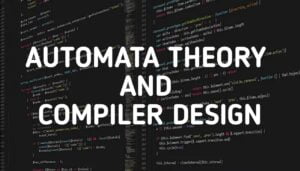
21CS51 AUTOMATA THEORY AND COMPILER DESIGN
Module - 1
Introduction to Automata-Theory: Central Concepts of Automata-theory, Deterministic Finite Automata(DFA), Non- Deterministic Finite Automata(NFA) ,Epsilon- NFA, NFA to DFA Conversion, Minimization of DFA
Introduction to Compiler Design: Language Processors, Phases of Compilers
Module - 2
Regular Expressions and Languages: Regular Expressions, Finite Automata and Regular Expressions, Proving Languages Not to Be Regular
Lexical Analysis Phase of compiler-Design: Role of Lexical Analyzer, Input Buffering , Specification of Token, Recognition of Token.
Module - 3
Context Free Grammars: Definition and designing CFGs, Derivations Using a Grammar, Parse Trees, Ambiguity and Elimination of Ambiguity, Elimination of Left Recursion, Left Factoring.
Syntax Analysis Phase of Compilers: part-1: Role of Parser , Top-Down Parsing
Module - 4
Push Down Automata: Definition of the Pushdown Automata, The Languages of a PDA.
Syntax Analysis Phase of Compilers: Part-2: Bottom-up Parsing, Introduction to LR Parsing: SLR, More Powerful LR parsers
Module - 5
Introduction to Turing Machine: Problems that Computers Cannot Solve, The Turing machine, problems, Programming Techniques for Turing Machine, Extensions to the Basic Turing Machine
Undecidability : A language That Is Not Recursively Enumerable, An Undecidable Problem That Is RE.
Other Phases of Compilers: Syntax Directed Translation- Syntax-Directed Definitions, Evaluation Orders for SDD’s. Intermediate-Code Generation- Variants of Syntax Trees, Three-Address Code.
Code Generation- Issues in the Design of a Code Generator
dolores et sapiente deleniti dolor doloremque placeat nihil nobis possimus perspiciatis. sint et et voluptatem nulla iure et mollitia provident qui reprehenderit qui.
asperiores expedita inventore et minima et. expedita occaecati labore perspiciatis quam sed quisquam est ipsam itaque.